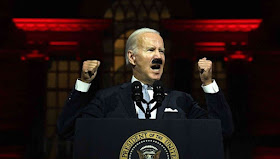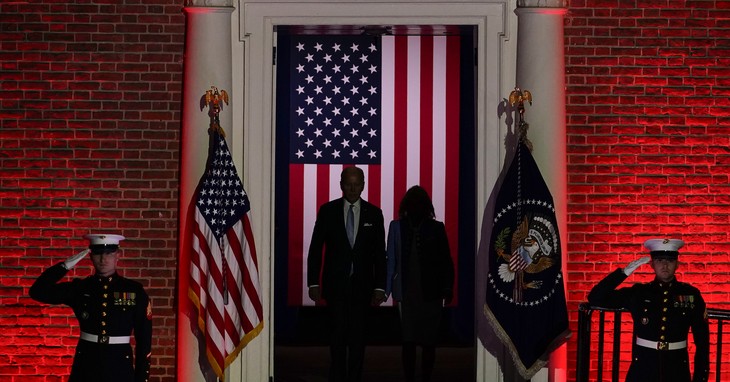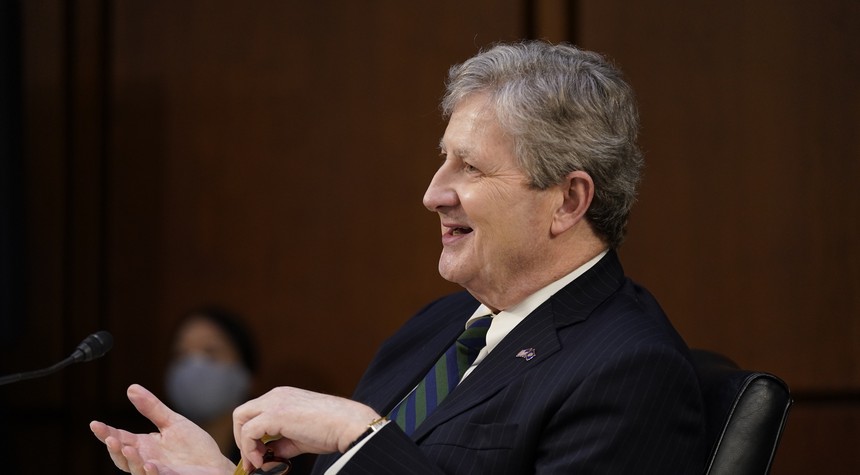It’s a good thing Joe Biden is such a mediocre public speaker, because his political beliefs are positively dangerous.
In a primetime address Thursday in front of Independence Hall—complete withominous red mood lighting and the occasional blaring of police sirens and hecklers—Biden effectively declared war on half the country.
“MAGA Republicans do not respect the Constitution,” he said. “They do not believe in the rule of law. They do not recognize the will of the people. They refuse to accept the results of a free election . . . They embrace anger. They thrive on chaos. They live not in the light of truth but in the shadow of lies.”
While he qualified his remarks by saying “not every Republican is a MAGA Republican,” he does not mean it. He knows that a strong majority of Republicans have a favorable view of Trump and will support him if he runs again.
Something like 70 percent of Republicans are skeptical of the 2020 election, not least because in real life practically no one has a kind word for Joe Biden. Moreover, as time goes on, we learn more and more about the FBI and the tech monopolies’ role in rigging the 2020 election.
A belief in the Constitution or democracy does not require one to accept fishy results from a fishy election, characterized by the unprecedented use of mail-in voting, late night counts, and numerous other irregularities. As I argued earlier, “One of the problems with all the democracy talk is that both sides think they are upholding democracy . . . [The] chief objection of Trump and his supporters, whether they were present on January 6 or not, is that something really fishy happened in the 2020 election, and that the result was the opposite of democracy.”
Biden is not an interesting thinker. He is also not a clear-thinking one. His speeches, with their meandering contradictions, have a whiff of focus-group testing. Thus, every word out of his mouth sounds like a cliché or an attempt to flatter his audience. But this speech’s dark turn and Biden’s willingness to attack not just his political opponents but the other party’s voters—in other words, fellow citizens—was truly remarkable and unsettling.
Biden had the same problem to a lesser degree with his inauguration speech. While it was superficially moderate and appeared to extend an olive branch to those who didn’t vote for him, the broad stroke condemnation of “political extremism” and “domestic terrorism” left millions of Americans out of the fold. Then and today, Biden does nothing to distinguish passionate and aggrieved Trump supporters—who donated, rallied, held signs, and voted—from the very small number who broke the law on January 6.
Biden’s proposed unity is entirely conditional and self-serving. Either get behind him, and accept his and the establishment’s legitimacy, or be harassed, exposed, and possibly imprisoned. This “with us or against us” kind of talk used to be reserved for al-Qaeda and ISIS.
Biden is nostalgic for the America of his young adulthood, a time of fairly limited political disagreement, bipartisan dealmaking, and mutual restraint by both parties; in other words, he is nostalgic for a time where elections did not matter very much.
In addition to his nostalgia, he refuses to confront recent history. The speech contained very little soul-searching for his and his party’s role in declining domestic tranquility. His condemnations of extremism and political violence would be more convincing if he and his fellow Democrats heartily condemned Antifa and Black Lives Matter rioters in the summer of 2020. Instead, they treated those thugs as the conscience of the nation.
As in other conflicted relationships, playing the victim and taking no responsibility for one’s own role in the conflict is not a formula to keep the peace or to maintain the relationship. In fact, it is infuriating and only inspires contempt.
Extreme political disagreement is unavoidable now because the two camps have entirely different values, priorities, conceptions of history, distinct economic interests, and basically do not like each other. In other words, to have normal politics there must be some agreement on who constitutes “the people” and what the society’s organizing principles are. While there may have been such a consensus for most of American history, it has recently frayed beyond recognition.
These challenges are not uncharted waters. One way to resolve disagreement is to separate. In other nations and epochs, this has happened many times. Such a solution means we each live the way we want among people with whom we are willing to accept common rules and rulers. Separations can be peaceful or they can be bloody, and, for obvious reasons, the former is preferable.
Another solution that emerged from Europe’s wars of religion is to have the scope of politics retreat, radically. A century of violence led to the first liberals, who advocated for a minimalist state that did not try to use politics to resolve questions of fundamental value, but rather focused on the basics and left a large swath of life up to individual conscience.
Combining these two principles was, in fact, a major component of the American constitutional system. Partial separation was permitted through federalism. Limited government was secured through the Constitution’s limits on state powers. Rather than Biden’s Disneyfied view of American history, channeling conflict to avoid domestic political violence was a major purpose of our constitutional structure.
But American federalist and limited government principles have been degraded by a combination of the 20th-century administrative state, the assault on state sovereignty under the rubric of civil rights, widespread ignorance about the theory and history of American political life, and hostility to local customs under the Procrustean demands of modern leftism. Thus, the Constitution is doing little to restrain the storm clouds of brewing conflict.
There is one more alternative: One of the camps may thoroughly defeat and disempower its opponents. Judging by Biden’s Manichean talk of Our Democracy™, the recent harassment of former President Trump, and the demonization of huge swaths of the American people, this appears to be what is really driving Biden’s recent partisan call to action.
Something is coming.












